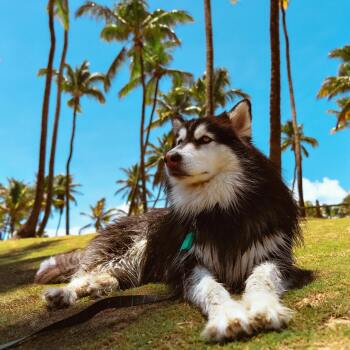Alaskan Malamutes

The Alaskan Malamute isn’t just a dog—it’s a dependable friend, a playful spirit, and a source of boundless love. With their warm personality and strong build, Malamutes are ideal for families who want a dog that’s as adventurous as it is affectionate.
Why Malamutes Win Hearts
- Deeply affectionate and bonded to their humans
- Friendly, outgoing, and sociable with familiar faces
- Excellent playmates for children
- Brimming with playful energy
- Thrive in cold weather with their muscular, powerful build
Traits to Keep in Mind
- High-energy needs require regular exercise and mental engagement
- Early training and socialization are essential for well-balanced behavior
- That gorgeous coat? It needs consistent brushing to stay clean and mat-free
- Known for digging—so you may want to supervise outdoor time
- Best with proper guidance around small animals and pets
Is It Worth It? Absolutely.
Caring for a Malamute means embracing their personality—from their joyful energy to their occasional howls. They thrive in active households and love being included in both outdoor fun and indoor downtime. Yes, they’ll keep you on your toes, but they’ll also fill your home with joy, devotion, and a dash of wild charm.
A Look Back in Time
Alaskan Malamutes are among the oldest Arctic sled dogs, with origins dating back over 4,000 years. Developed by the Mahlemut Inuit people, these dogs were bred for strength and endurance—not speed. With proper care, they can enjoy healthy lives of around 12 years or more.
Common Health Considerations for Malamutes
- Hip Dysplasia— This inherited condition can cause joint instability and arthritis. Symptoms include limping or difficulty standing. Keeping your Malamute lean and active can delay symptoms, and treatment may include surgery in advanced cases.
- Dwarfism— Short-legged Malamutes may have a form of inherited dwarfism. While it isn’t painful, it’s not a desired trait in this breed, and affected dogs shouldn’t be bred.
- Bloat (GDV)— A serious, often fatal condition where the stomach twists and traps gas. Symptoms include pacing, drooling, retching, and a swollen belly. Emergency care is critical—preventive surgery may also be considered for high-risk dogs.
- Peripheral Neuropathy— A rare nerve disorder appearing as early as 8 weeks. Symptoms include weakness, wobbly walking, and an unusually loud bark. There’s no cure, but supportive care can help some dogs recover function.
- Hypothyroidism— Low thyroid levels can cause fatigue, weight gain, and skin issues. A simple blood test can diagnose it, and daily medication keeps it under control.
- Epilepsy— Genetic seizures typically begin between 6 months and 3 years old. Medication is usually needed for life. During an episode, keep your dog safe, but never try to hold their mouth.
- VKH Syndrome— This autoimmune disease attacks pigment cells, leading to skin and eye problems. Symptoms include color changes on the nose and lips and sensitivity to light.
- Diabetes— Malamutes are at higher risk for diabetes. Watch for increased thirst, appetite, urination, and weight loss. Insulin injections and a consistent diet can manage the condition effectively.
- Cancer— With longer lifespans comes a higher risk of cancer. Early detection—via regular wellness checks—can make treatment more effective.
- Alopecia X— This condition causes patchy hair loss or woolly coats. While mainly cosmetic, it may respond to hormonal treatments or neutering. Dogs with this condition should not be bred.
- Eye Conditions to Watch
- Progressive Retinal Atrophy (PRA)— Causes gradual vision loss. While not painful, it leads to blindness over time.
- Cataracts— Can cloud vision in older dogs but may be corrected with surgery.
- Other Conditions to Keep on Your Radar
-
- Zinc-Responsive Dermatosis— A skin issue caused by poor zinc absorption. Supplementation usually helps.
- Mange— Overgrowth of skin mites can lead to irritation and hair loss. Treatment is usually manageable and long-term.
- Bleeding Disorders (like Hemophilia)— Clotting issues can go unnoticed until surgery or injury—bloodwork before procedures is crucial.
- Retained Baby Teeth— Puppy teeth that don’t fall out can cause crowding or infections. Vets may recommend removal.
- Heart Conditions— Some Malamutes may develop heart disease. Routine vet visits, dental care, and a healthy weight help reduce risk.
Wrap-Up: Majestic and Devoted
Alaskan Malamutes are stunning in appearance and rich in personality. They require committed owners who understand their energy and health needs—but the reward is a deeply loyal, joyful companion who brings the spirit of the Arctic into your home.
Ready to Learn More? We’re Here to Help!


